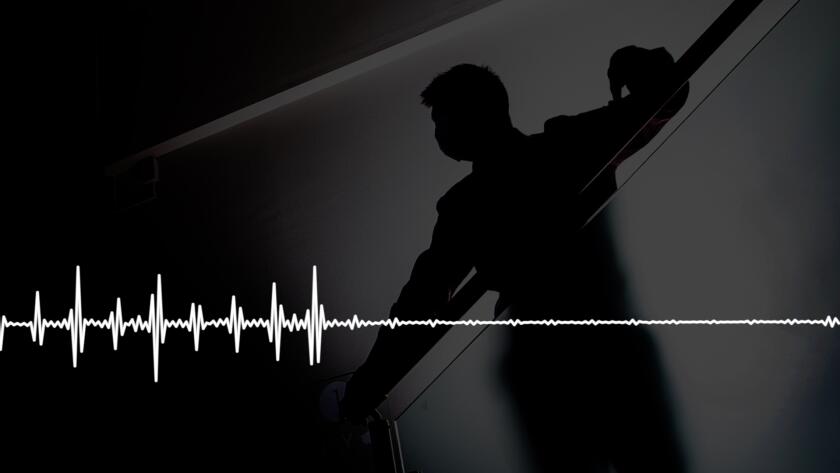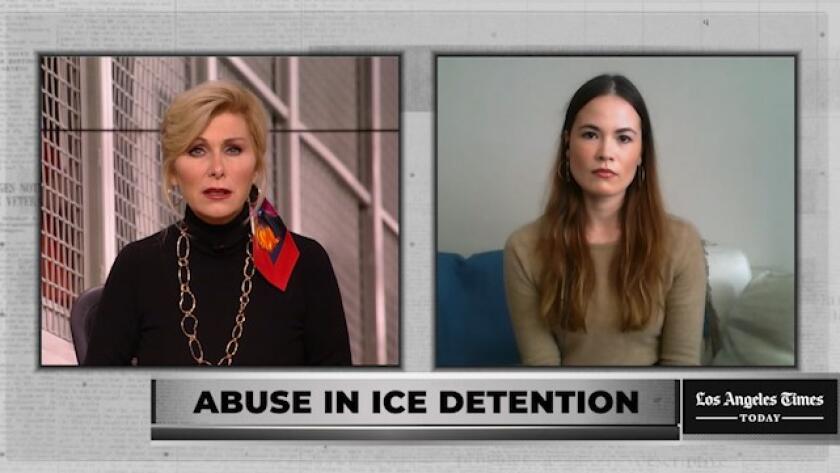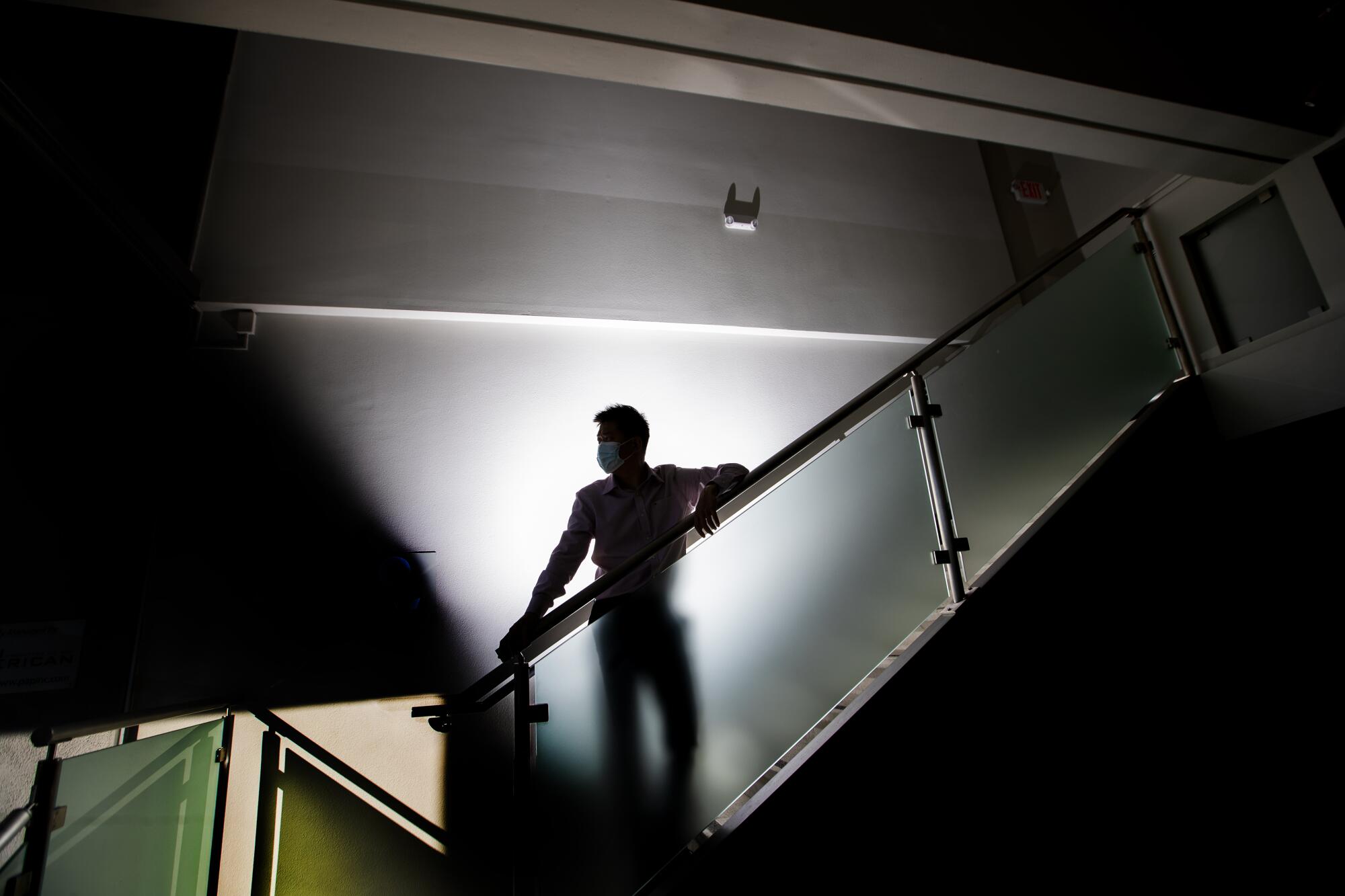
A Times investigation found that since 2017, at least 265 calls have reported violence and abuse inside California’s four privately run immigrant detention centers. Half of them alleged sex crimes against detainees.
J. Lee stirred awake in early June at an immigration detention facility to find one of his cellmates sliding a hand down his pants.
Lee, 38, had overstayed a tourist visa from South Korea and was now locked in a cell 22 hours each day with two strangers — one of whom had been convicted of soliciting the murder of a family of 10 in Belize. The third cellmate had told Lee that the Belizean man was violating Lee as he slept.
This time Lee felt it.
He tried to report the incident, but 911 is disabled on phones accessible to detainees at the Adelanto ICE Processing Center where he was held, according to Immigration and Customs Enforcement. He said staff told him they would report the incident but gave him no updates. Desperate for help, he asked a lawyer who was investigating coronavirus issues at the facility to report his allegations to the San Bernardino County Sheriff’s Department, which sent a deputy to interview the three detainees.
Afterward, Lee said, he began having panic attacks. He wrote to an ICE agent, “How can I do to get out of this nightmare?”
Details of the incident are described in a police report. Lee confirmed those and details of the aftermath in interviews with The Times, health records and federal court documents. The Times generally does not fully name victims of sexual abuse, except when they volunteer to be publicly identified.
Lee’s witness was deported June 22. A week later, the district attorney’s office decided not to prosecute, citing lack of evidence.
A Times investigation found that since 2017, at least 265 calls made to police through 911 and nonemergency lines have reported violence and abuse inside California’s four privately run federal detention centers overseen by ICE. Half the calls alleged sex crimes, including rape, sexual assault and abuse against detainees. The rest were to report assault, battery and other threats of violence against detainees and staff.
In only three cases in which detainees said they were victimized did records show a suspect was charged, The Times found, and in two of those, the suspects were deported before they could be arrested. One case involving two victims — a staff member and a detainee — is pending.
Prosecutors were more likely to pursue cases in which the victims worked at the facility. Among 41 calls alleging attacks on staff members, charges were filed in 12 cases.
Unlike in prisons and jails, people in ICE detention are not serving time for crimes — they are being held while immigration judges decide whether they should be deported. Many are asylum seekers, and most have no criminal history. The federal government is responsible for their safety.
J. Lee recounts being sexually assaulted by another detainee at the Adelanto ICE Processing Center on June 3. Lee said facility staff told him they would report the incident but gave him no updates.
For years, advocates and detainees have complained about unchecked violence within these facilities.
The Times examined hundreds of pages of public records, including federal investigative reports, 911 calls and court documents, and interviewed federal and local officials as well as detention center representatives and detainees.
What emerged is a picture of a system in which violence can be perpetuated against detainees with impunity, both by other detainees and facility staff. Detainees were banned from calling 911, according to ICE, and forced to rely on others to report allegations on their behalf.
Some private detention centers brokered agreements with law enforcement agencies that dictated which crimes officers would respond to. When police did intervene, some were discouraged from investigating, prevented by staff from speaking to detainees who had alleged abuse and instructed not to pursue cases they said had merit, according to police reports.
ICE declined an interview request about The Times’ findings but provided written responses to select questions.
“ICE is committed to a culture that promotes safety and has zero-tolerance for abuse of any kind,” spokeswoman Paige Hughes said in a statement. “ICE is committed to transparency, collaboration, and resolving all concerns, complaints, and allegations with individuals in ICE custody.”
Representatives of the companies that operate ICE facilities in California said they always contact law enforcement to investigate potential criminal allegations and also conduct their own administrative investigations.
In Lee’s case, his alleged abuser was moved to a different cell. The stress caused Lee to lose 35 pounds. He couldn’t sleep. He wrote to a psychiatrist, pleading, “I don’t wanna die in here.”
::
Over the last four decades, the nation has built a network of facilities to house tens of thousands of people while their immigration cases are decided. The vast majority are owned or managed by for-profit corporations.
In California, four facilities have the capacity to hold more than 4,000 people: the Otay Mesa Detention Center, operated by CoreCivic; the Adelanto and Mesa Verde ICE processing centers, operated by GEO Group; and the Imperial Regional Detention Facility, operated by Management and Training Corp.
These centers are supposed to comply with care and safety standards set by ICE. Their daily operations fall to the companies, whose staff are not sworn law enforcement officers and do not have the authority to conduct criminal investigations. Although ICE agents are on-site to handle immigration matters, they also do not have the authority to criminally investigate allegations of abuse, agency officials told The Times.
ICE requires detention facilities to notify local law enforcement about any potential crimes. The decision to prosecute violations of state law is “the sole responsibility of the local law enforcement agency,” ICE spokeswoman Britney Walker said.
The companies have been sued repeatedly over allegations of violence and are the subject of numerous federal reports over failures to keep detainees safe.
Troubled by conditions in the state’s privately run prisons and detention centers, California leaders banned new contracts after Jan. 1 of this year and ordered existing facilities to close by 2028. In September, Gov. Gavin Newsom signed Assembly Bill 3228, which requires private prison companies to adhere to ICE’s detention standards and allows people to sue the companies for violations.
Some agreements between for-profit facilities and local governments, however, have prevented investigations into allegations of detainee abuse, law enforcement officials said.
In late 2018, Abel Lopez Serrano was being held at the Adelanto facility when a deportation agent told him to go back to El Salvador and threatened to “f— him up” after he refused to sign paperwork, he said in an interview.
The agent took Lopez to a room outside the view of cameras, according to an 83-page investigative report by the Department of Homeland Security’s inspector general. Lopez, 43, said the agent then slammed him into a concrete wall.
The next day, Lopez’s fiancee visited and saw his right eye swollen and bruised, she said in an interview. She called 911.
A San Bernardino County sheriff’s deputy responded, but a facility staff member barred him from entering, saying the incident was being investigated at the federal level, a police incident report and federal records show.
The Sheriff’s Department told The Times that current practice is for the Homeland Security Department to investigate federal employees accused of wrongdoing.
ICE, however, told The Times that local law enforcement “has jurisdiction and can open a criminal investigation.”
The Sheriff’s Department also told The Times that it has followed an agreement between the city of Adelanto and GEO Group that details the types of calls to which sheriff’s officials “shall” respond, including “violent felony, such as homicide or assaults on staff” and sexual assaults. Any crime not listed, the Sheriff’s Department told The Times, would be investigated by the FBI or ICE.
Under the Adelanto agreement, GEO Group paid the city $174,866 a year for a sheriff’s deputy to respond to calls from the facility.
Sheriff’s officials initially cited the agreement as a reason why they did not investigate a 2017 allegation that detention staff assaulted a detainee and a 2018 case in which a group of detainees allegedly assaulted another detainee.
Sheriff’s Department spokeswoman Cindy Bachman later said the agreement is used as a “guideline.” She said she was not aware that it had expired in 2016.
Deputies “investigate each case thoroughly,” Bachman said.
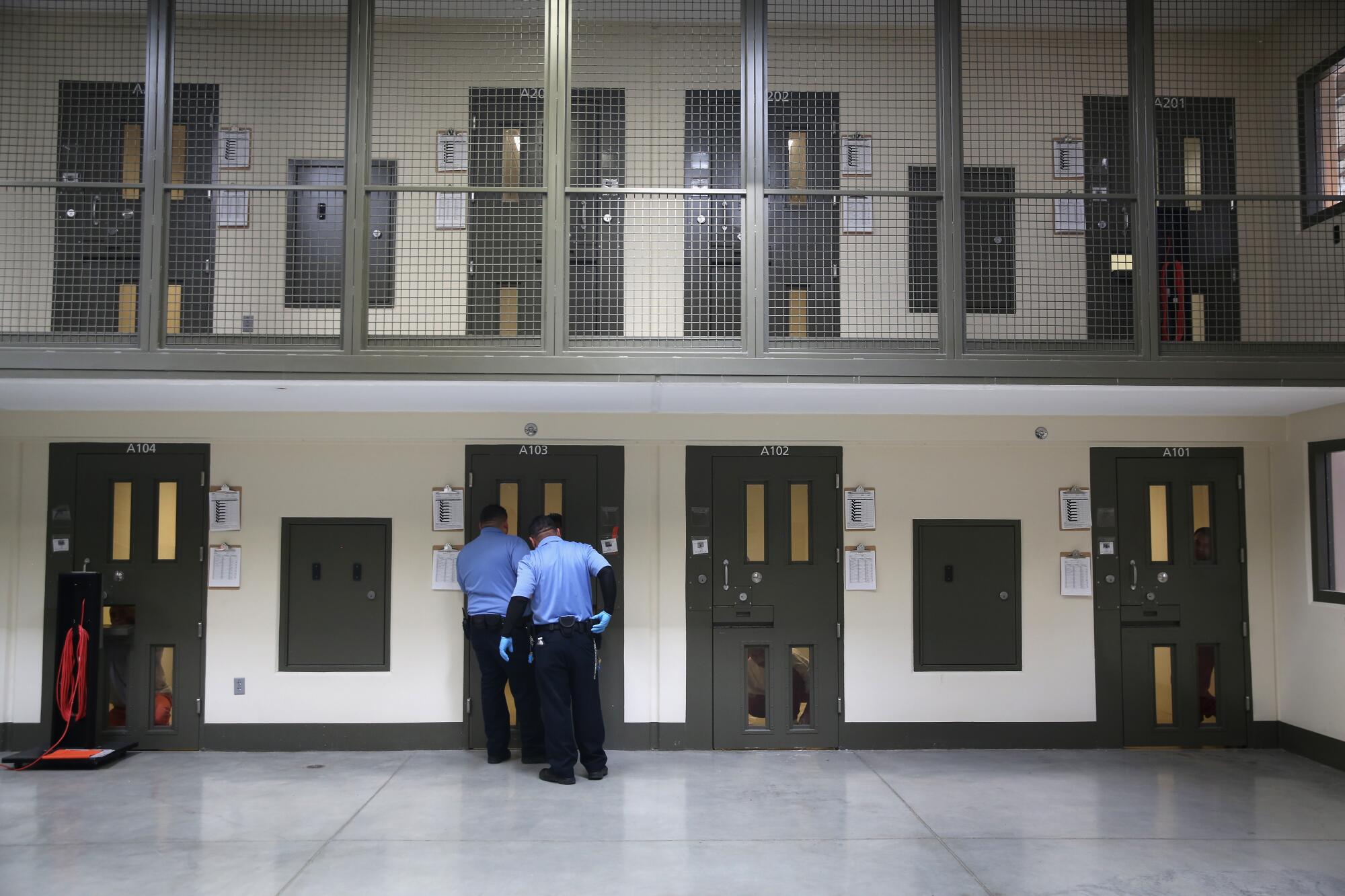
The Mesa Verde facility, also run by GEO Group, has an agreement that police said limited their role to investigating “major criminal conduct,” such as homicide and sexual assault.
Grace Meng, a lawyer who investigates detention conditions for Human Rights Watch, said she finds the agreements disturbing.
“It seems like ICE, prison officials and local law enforcement agencies are each trying to pass the buck, and the victims of crimes are in the middle,” she said.
GEO Group spokesman Pablo Paez sent a statement in response to more than a dozen questions from The Times: “We take our responsibility to ensure the health and safety of all those in our care and our employees with the utmost seriousness, and we are committed to working with all pertinent law enforcement agencies as appropriate.” He declined to comment on the Lopez case.
Hughes, the ICE spokeswoman, said the agreements are not “made to hinder or prohibit thorough investigations by officials.”
The investigation of Lopez’s case was left to the Homeland Security Department’s inspector general. While it was underway, Lopez was deported. Investigators determined a confrontation had taken place between Lopez and the agent but said they found “no conclusive evidence” to support the assault allegation. The U.S. attorney’s office said it would not prosecute the case and authorized investigators to question the agent while preventing his answers from being used against him in a criminal prosecution.
According to the report, when federal investigators asked the agent whether he caused Lopez’s black eye, the agent said, “I placed him on the wall, that’s all I did.” Investigators asked whether that action caused the black eye.
The agent’s reply: “Anything is possible.”
At Otay Mesa, an agreement sets the rules for how sexual abuse allegations are investigated.
Although federal law requires the facility to report such cases to law enforcement, a 2014 agreement between CoreCivic and the San Diego County Sheriff’s Department names the warden, who is not a sworn law enforcement official, as the person who “will determine whether there is credible evidence to support the allegation.”
CoreCivic says every allegation is reported, and according to spokeswoman Amanda Gilchrist, the agreement is “not relevant” because a 2003 federal law, the Prison Rape Elimination Act, would “override” any local agreement. She said CoreCivic would contact the Sheriff’s Department to remove the language.
Sheriff’s Department spokesman Lt. Ricardo Lopez told The Times that before this year, some deputies did not respond to calls that alleged crimes at Otay Mesa. Instead, they would wait for the facility to complete an internal investigation, which was shared with detectives. He said that changed after The Times started asking questions for this story.
“I think in looking at some of that, and some of the things you brought up, I think it’s best that we do go out there and evaluate it for ourselves and get some assistance from them on some of the things we need to help on the investigation,” Lopez said.
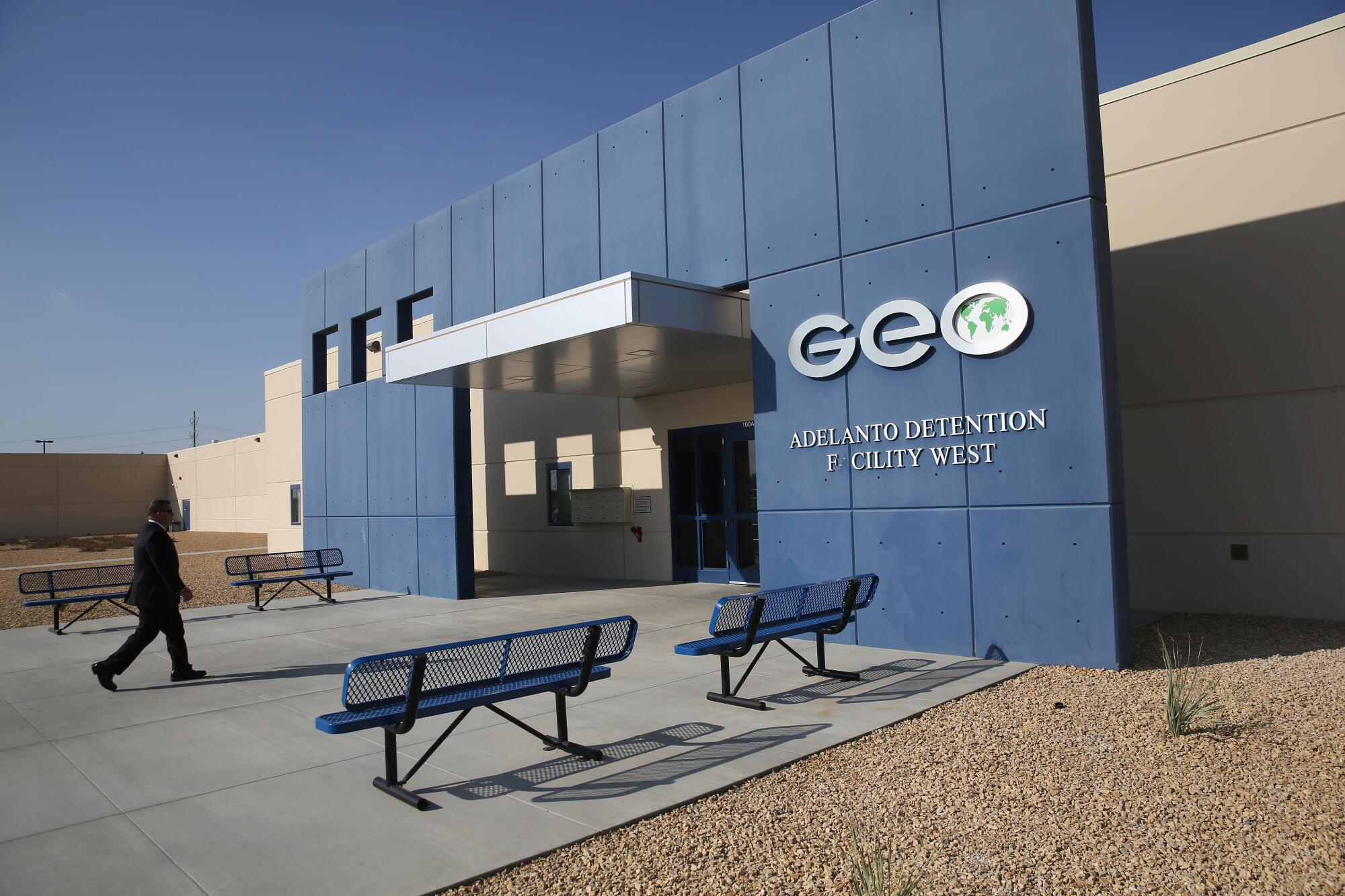
The Times also found instances in which police were discouraged by detention center staff from pursuing criminal cases.
In April 2017, a detainee at Mesa Verde was in a bathroom when another detainee grabbed his buttocks and tried to “penetrate him with his penis,” according to a police report. The victim ran to his bed and stayed there until morning, when Bakersfield police were called.
An officer interviewed the victim and suspect but was told by the center’s security chief that “no further police action was needed,” according to the report. The case was closed.
Similarly, in December 2016, a detainee told staff he had been groped by another detainee. Two officers interviewed the victim and suspect and watched surveillance video that showed the detainee’s genitals being grabbed while he talked on the phone, according to a police report.
An employee told officers “no further law enforcement action needed,” according to the report, which also indicated GEO Group employees had disciplined the man who reported the assault.
Bakersfield Police Sgt. Nathan McCauley said, “Statements by a third party regarding documentation or follow-up are not considered when assigning detectives or closing the case.”
A month after the 2016 incident, Bakersfield Police Det. Jeffrey Paglia reviewed the case and noted in the police report that the officers had been improperly instructed by the GEO Group employee “that this case only required documentation and would be investigated internally.”
Paglia reevaluated the evidence, including statements by the detainee who reported the assault. “I believe that [he] is being truthful and that he was unfairly disciplined,” he wrote.
In response to questions about these incidents, Paez, the GEO Group spokesman, said that facility staff members are trained to report sexual assault allegations to law enforcement. “GEO takes appropriate action should a staff member fail to follow these mandatory rules and procedures,” he said.
Paglia did not respond to requests for an interview. According to the police report, he concluded that sexual battery charges were warranted and submitted the case to prosecutors. Three months later, the report shows, he was told the victim had been deported.
The case was closed.
::
A fraction of the calls to police examined by The Times alleged assaults on facility staff, but they represent nearly all of the cases prosecuted.
Of the 265 calls from Jan. 1, 2017, to June 6, 2020, analyzed by The Times, 63 cases were submitted to prosecutors. Fourteen were accepted. In 12 of those, the victims were staff or ICE agents — including the pending case that involves both a staff member and a detainee.
“I would like to at least allow those victims to have their day in court,” said Imperial County Deputy Dist. Atty. Kevin Cayton, who filed the charges in the pending case. Detainees, he said, are “not being held because they’re criminals necessarily — they’re being held based upon immigration issues, and they should not be subject to violence while they’re in detention.”
Michael Bires, a spokesman for the San Bernardino County district attorney’s office, said prosecutors do not give “preferential treatment to those who are in the United States legally, versus those who are not.”
“Just because someone calls the police does not mean a crime did in fact happen,” he added.
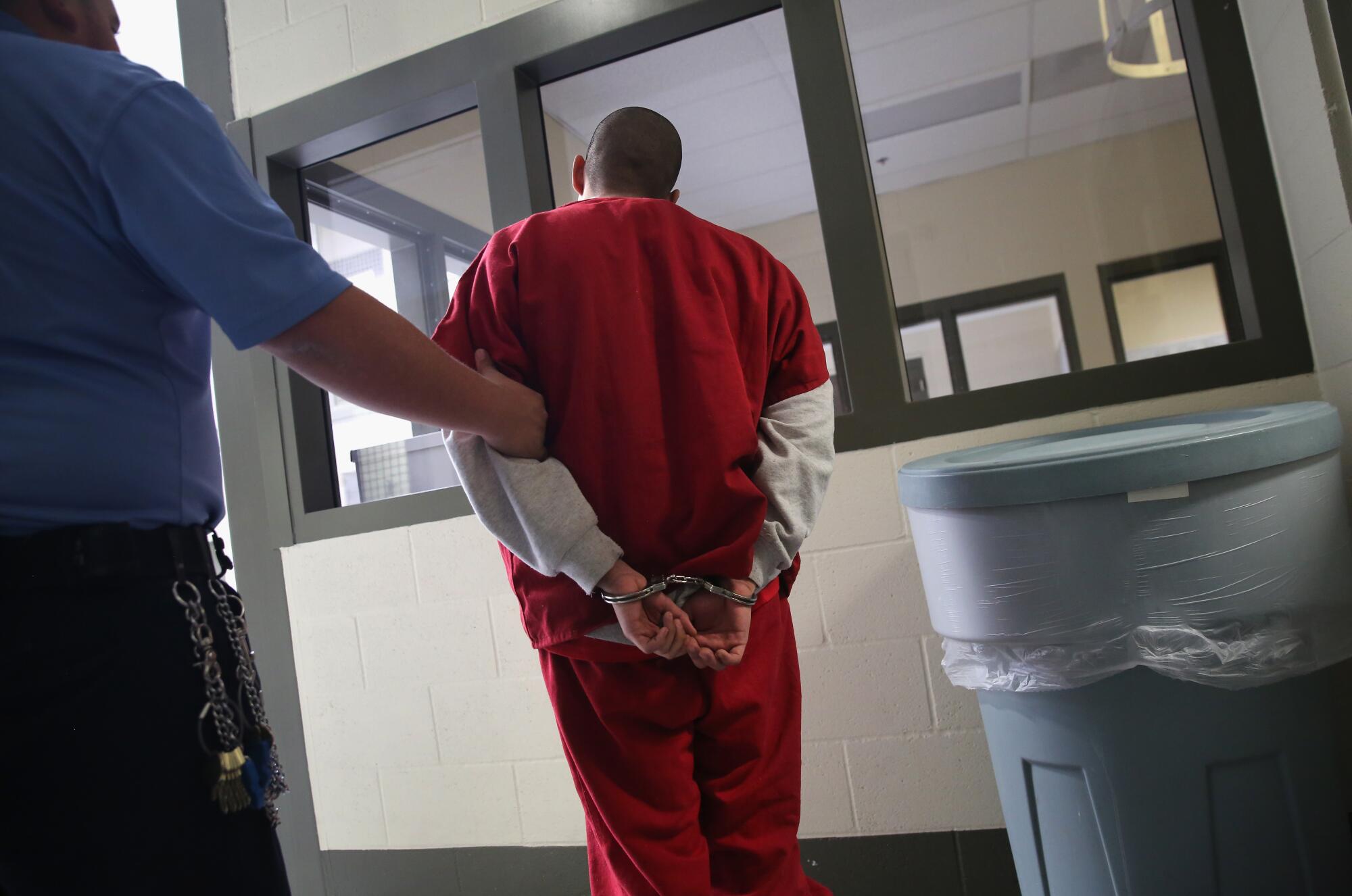
Prosecutors say that in some instances, deportation has made it difficult to gather enough evidence to proceed with a case.
Beyond that, “sometimes, individuals who are detained are reticent to cooperate with an investigation or prosecution,” said Steve Walker, a spokesman for the San Diego County district attorney. “In addition, some alleged victims may have criminal histories, and their credibility with a jury is one factor that must also be considered.”
The Times found two cases in which suspects were deported before they could face trial for assaults on other detainees.
One of those cases involved Geovany Murillo, now 27, who was detained at the Adelanto facility in 2017 after fleeing gang violence in Honduras. Murillo asked to be identified by his middle and second last names.
He said he was constantly harassed by his 53-year-old cellmate, who watched him shower, masturbated in front of him and slapped his buttocks. The man also grabbed a third cellmate’s genitals, a police report says.
In February 2018, prosecutors filed two counts of misdemeanor sexual battery against the man, Rodolfo Audelo. But before the case went to trial, Audelo and both victims were deported.
ICE declined to comment on specific cases. But speaking broadly, Britney Walker, the agency spokeswoman, said officials “have significant discretion” in determining whether to hand a suspect over for prosecution.
Gabriel “Jack” Chin, a UC Davis professor and expert in criminal and immigration law, said local authorities legally can take custody of suspects and prevent deportation of witnesses in federal custody.
“Functionally, the system is saying, ‘This isn’t our problem,’” he said.
Murillo, now in Honduras, learned this year about Audelo’s deportation from a reporter.
He wondered aloud: “How could it be that there isn’t punishment for people like this?”
Watch L.A. Times Today at 7 p.m. on Spectrum News 1 on Channel 1 or live stream on the Spectrum News App. Palos Verdes Peninsula and Orange County viewers can watch on Cox Systems on channel 99.
This story was reported with help from the USC Annenberg Center for Health Journalism’s Data Fellowship.
More to Read
Sign up for Essential California
The most important California stories and recommendations in your inbox every morning.
You may occasionally receive promotional content from the Los Angeles Times.
